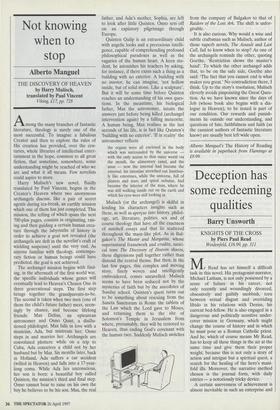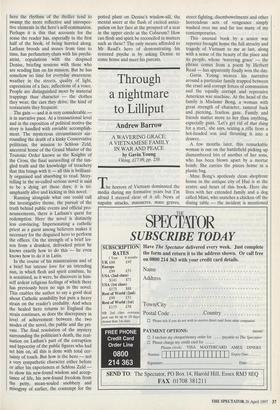Deception has some redeeming qualities
Barry Unsworth
KNIGHTS OF THE CROSS by Piers Paul Read Weidenfeld, £16.99, pp. 311 Mr Read has set himself a difficult task in this novel. His protagonist-narrator, Michael Latham, is not only possessed by a sense of failure in his career, not only recently and woundingly divorced, obsessively and guiltily snobbish, torn between sexual disgust and overriding libido in his relations with Denise, his current bed-fellow. He is also engaged in a dangerous and politically sensitive under- cover mission in Germany, which might change the course of history and in which he must pose as a Roman Catholic priest. And he, which of course means Mr Read, has to keep all these things in the air at the same time and give them their proper weight, because this is not only a story of action and intrigue but a spiritual quest, a search for the healing of the hero's mani- fold ills. Moreover, the narrative method chosen is the journal form, with daily entries — a notoriously tricky device.
A certain unevenness of achievement is almost inevitable in such an enterprise and here the rhythms of the thriller tend to swamp the more reflective and introspec- tive elements in the hero's self-communion. Perhaps it is this that accounts for the sense the reader has, especially in the first half of the book, of being hurried along. Latham broods and muses from time to time, has perfunctory chats with his psychi- atrist, copulations with the despised Denise, briefing sessions with those who are sending him on his mission. But he has somehow no time for everyday awareness: weather in the streets, quality of light, expressions of a face, inflections of a voice. People are distinguished more by material trappings than character — the clothes they wear, the cars they drive, the kind of restaurants they frequent.
The gain — and it is very considerable is in narrative pace. At a transactional level and in the exposition of political motive the story is handled with enviable accomplish- ment. The mysterious circumstances sur- rounding the death of a kinky Conservative politician, the mission to Schloss Zeld, ancestral home of the Grand Master of the Teutonic Order known as the Knights of the Cross, the final unravelling of the tan- gled truth and the knowledge of treachery that this brings with it — all this is brilliant- ly organised and absorbing to read. Story- telling in the so-called serious novel is said to be a dying art these days; it is tri- umphantly alive and kicking in this novel.
Running alongside what one could call the investigative theme, the pursuit of the truth behind public events and official pro- nouncements, there is Latham's quest for redemption. Here the novel is distinctly less convincing. Impersonating a catholic priest as a guest among believers makes it necessary for the disguised hero to perform the offices. On the strength of a brief les- son from a drunken, defrocked priest he knows exactly how to do this — he even knows how to do it in Latin.
In the course of his ministrations and of a brief but intense love for an intending nun, in which flesh and spirit combine, he is sensitised, as it were, he discovers in him- self ardent religious feelings of which there has previously been no sign in the novel. This enables the author to say a good deal about Catholic sensibility but puts a heavy strain on the reader's credulity. And when the healed hero returns to England the strain continues, as does the discrepancy in level of achievement between the two modes of the novel, the public and the pri- vate. The final resolution of the mystery surrounding the politician's death, the real- isation on Lathan's part of the corruption and hypocrisy of the public figures who had set him on, all this is done with total cer- tainty of touch. But how is the hero — not a very sympathetic character either before or after his experiences at Schloss Zeld to show his new-found wisdom and accep- tance of life, his new-found freedom from the petty, mean-souled snobbery and misogyny of earlier, the contempt for the potted plant on Denise's window-sill, the mental sneer at the flush of excited antici- pation on her face at the prospect of a seat in the upper circle at the Coliseum? How can flesh and spirit be reconciled in matters such as these? The only means afforded to Mr Read's hero of demonstrating his restored psyche is by asking Denise to come home and meet his parents.



































































 Previous page
Previous page